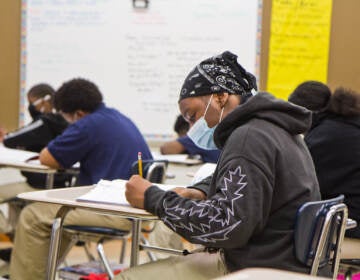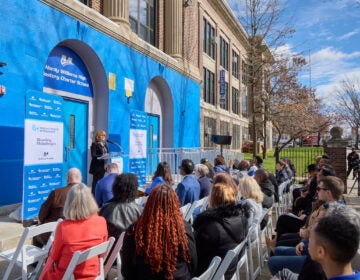‘It’s like we’re giving permission for these kids to struggle’: Inside a rural school district suing Pa. for more equitable funding
At Panther Valley Elementary in the heart of coal country, students struggle to learn in a leaky school building where needs run deep.
Listen 4:02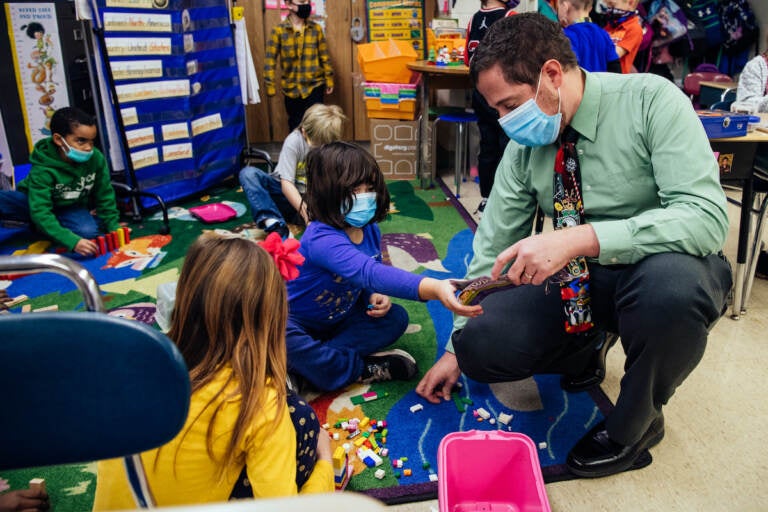
Principal Palazzo kneels beside students building with Legos so they can show him their progress during recess in a first grade classroom. (Dani Fresh for WHYY)
Just a few minutes into a recent tour of Panther Valley Elementary School, principal Robert Palazzo got word that the kindergarten boys’ bathroom was clogged. Again.
“This bathroom is a source of much frustration,” he said. There’s just one toilet for nearly 80 children, a stark illustration of how desperately the building needs an update.
Palazzo called for a plunger and directed children to another bathroom down the hall.
“Hang on buddy, that’s closed,” he said to a small boy who tried to push through the door.
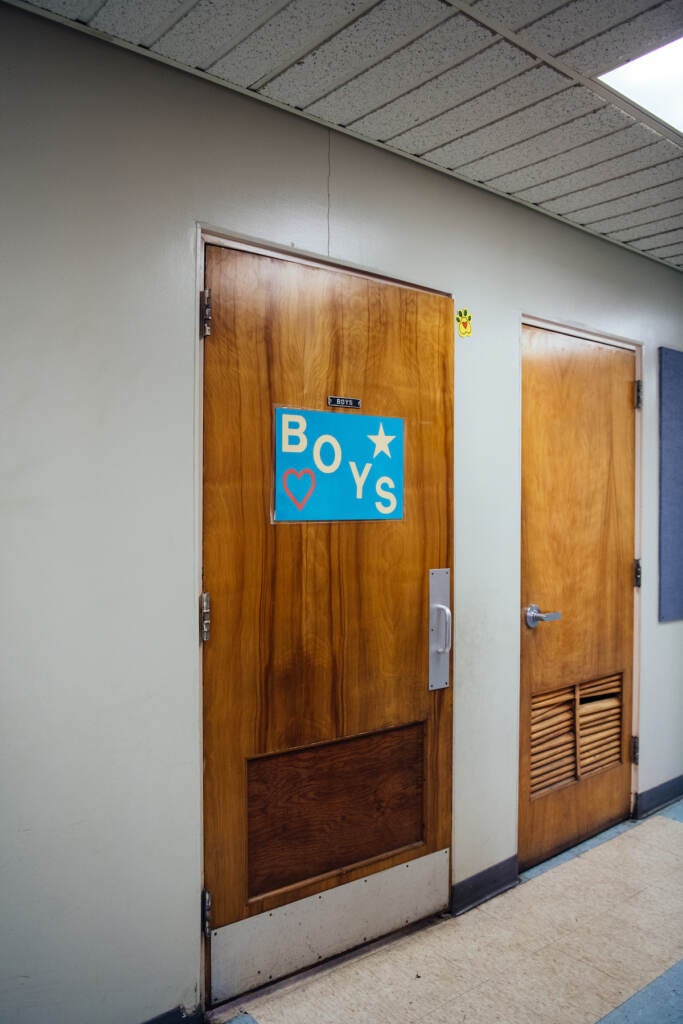
The Panther Valley School District doesn’t have enough money to renovate this bathroom or fix other physical issues, like a leaky roof and crumbling handicap accessible ramp.
Palazzo is a cheerful guy who clearly loves working with children. If you ever want to feel like a celebrity, he says, become an elementary school principal who gets a haircut. But his positive tone can’t disguise the worry in his voice when he talks about the building where he spends his days.
“Improving the physical structure of the school may not seem like a priority, but it speaks to the overall climate of the school, that we’re learning in a place that needs for so much,” Palazzo said.
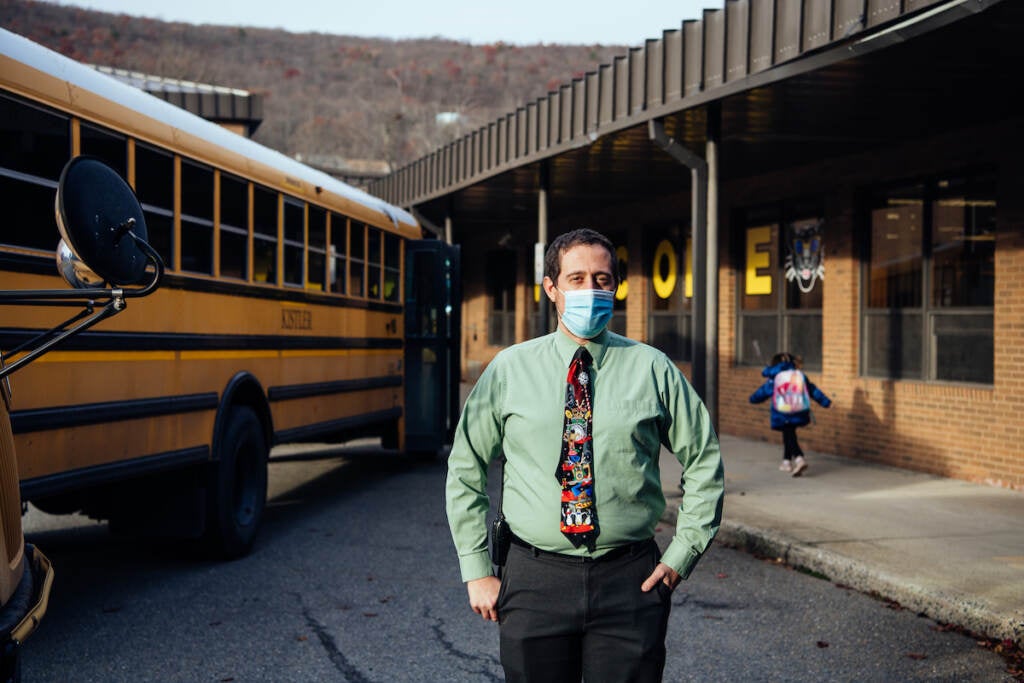
Seven years ago, Panther Valley joined five other school districts — along with several parents and two statewide advocacy groups — and sued state leaders, calling for adequate and equitable funding.
The case is currently playing out in Commonwealth Court. School leaders like Palazzo are watching closely, hoping the long-awaited trial eventually directs more money into their struggling districts.
‘The well’s dry now’
Panther Valley is a poor, rural district with more than 1,600 students from Carbon and Schuylkill Counties. Its elementary, intermediate, and junior/senior high schools serve four Pennsylvania towns: Summit Hill, Coaldale, Lansford, and Nesquehoning.
“It’s in the heart of what we used to refer to as the coal region of Pennsylvania,” said the district’s superintendent, David McAndrew.

As the country moved away from coal mining, residents lost work. Now, jobs are hard to come by.
Fifty-six percent of children in the district are classified as economically disadvantaged, though McAndrew believes the figure is closer to 70%.
“We have very few businesses,” McAndrew said. “The businesses we have, unfortunately, seem to be leaving us.”
One of the community’s main employers, a plant that makes fire trucks, is closing this spring and relocating its operations to Florida.
“Approximately 300 employees are out of jobs, and many of those employees have kids in our schools,” Palazzo said.
When businesses leave, Panther Valley also loses part of its tax base, pushing the already cashed-strapped district closer to the brink.
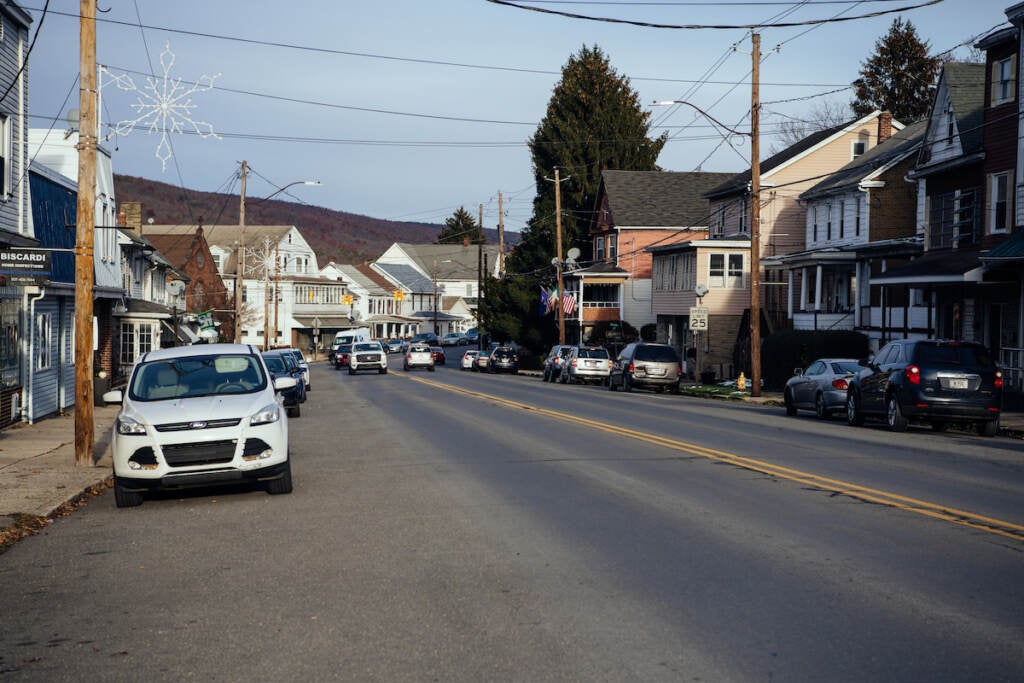
Like districts across the Commonwealth, Panther Valley relies heavily on local taxes to fund its schools. Pennsylvania ranks near the bottom, nationwide, in the percent of education funding that comes from the state.
It’s one of the statistics at the heart of the funding lawsuit; Plaintiffs say this model creates some of the widest spending gaps between poor and wealthy districts in the country.
Panther Valley has the 10th highest tax rate in the state, but still can’t raise enough money to meet students’ needs, McAndrew said. Continuing to raise local taxes isn’t an option.
“The well’s dry now,” he said. “We can’t keep going to the same group of people.”
He said the community’s tax base shouldn’t determine the type of education its children receive.
“Where we’re located shouldn’t mean that we don’t have resources for our kids,” McAndrew said. “Just because we don’t have land for warehouses and major corporations, doesn’t mean we shouldn’t have guidance counselors, assistant principals, more teachers, more paraprofessionals.”
A cascading effect on learning
The lack of resources shows up almost everywhere in Panther Valley Elementary School, from the mold climbing up the outside of the building to the large kindergarten classes.
Enrollment is up this year, but there isn’t enough money to hire more teachers, so there are currently 28 children in each class.
That high student-teacher ratio is especially troubling in a district like Panther Valley, Palazzo said. Many kindergarteners are already behind their peers on the very first day of class.
Only about 30-40% of incoming students have attended pre-K, he said. There aren’t many programs in the region.
“What we’re finding in kindergarten is before we get to the ABCs, one two threes, we need to get to, ‘Okay, this is how you sit, listen. This is how you follow one step directions. This is fine motor skills: taking your jacket off, putting your jacket on, opening your milk carton,’” he said.
“All these skills and these deficits are things that we’re trying to work on before we are able to move into what would be the traditional curriculum.”
From day one, teachers are playing catch up, and starting off behind can have a cascading effect.
“Maybe we could catch them up to a mid-kindergarten level by the end of kindergarten, so now they’re entering first grade behind,” Palazzo said. “That’s what we’re up against, and then COVID on top of that has really compounded the challenges.”
Panther Valley students perform below the state average on state assessments.
“These kids need smaller teacher ratios in order for them to make the progress that the state wants them to make, and there’s no way to do that without more money,” Palazzo said.
There is a bright spot this school year. The district received state funding to start its own pre-K program.
Palazzo stepped into a classroom with a soft green rug, colorful blocks stacked high. It’s where Panther Valley’s very first pre-K students are developing those critical skills that will help them succeed in kindergarten, like learning to play cooperatively and regulate their emotions.
Palazzo is thrilled with this new program and wants to see it grow. The school currently serves 19 pre-K students, just a small fraction of the children who will ultimately enroll in kindergarten. (This year’s class has 170 students.)
But even if the district received more state funding to expand pre-K, there wouldn’t be space for the students: The building is at capacity.
Even in positive situations, “there’s always some negative for us, one more hurdle for us to be successful,” McAndrew said. “Other schools, they have some money to maybe build a pre-kindergarten center or rent a place, but we don’t have the funds to do that.”
Still, they’re committed to clearing those hurdles. Palazzo said he’s looking to see if a partner agency might be willing to buy a vacant building, to house an expanded pre-K program.
“Everything we do is kind of a workaround,” he said.
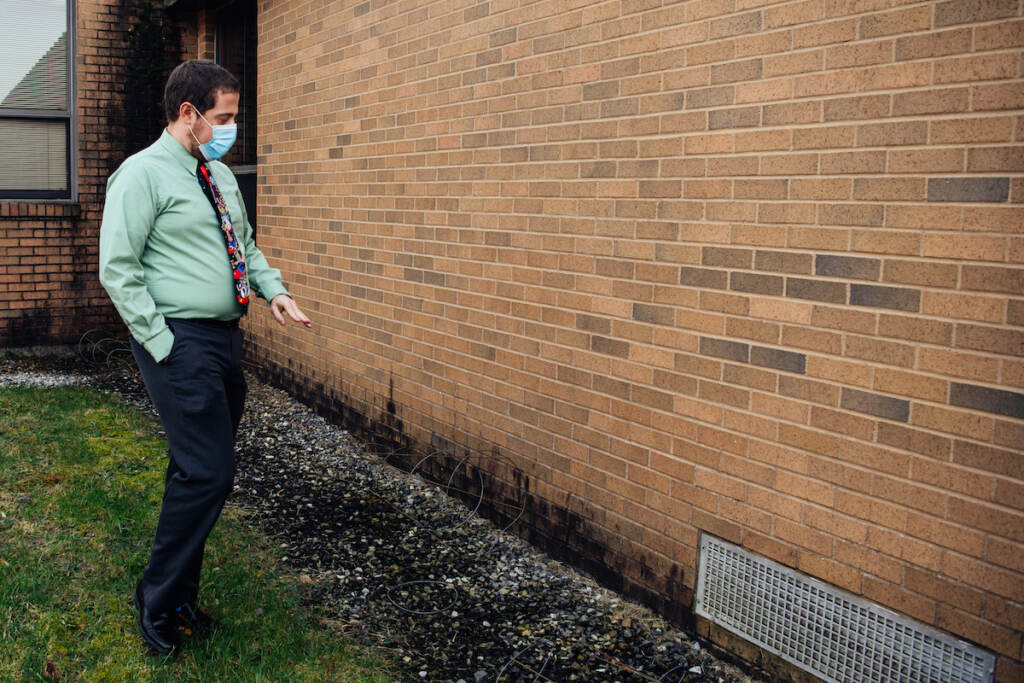
Precarious funding to help families beyond school doors
Those workarounds include doubling or tripling up on jobs. Palazzo, who’s led Panther Valley Elementary School for five years, also serves as a school psychologist and writes federal grants for the district.
“Every staff member has multiple roles because that’s just what it takes to keep the building going, staying in compliance,” he said.
The district also looks to fill gaps through partnerships and grants from community groups.
Recently, Palazzo wanted to hire a Family Development Specialist, someone who could help students facing issues like food and housing insecurity.
“We wanted to address the barriers students face before they even enter the school building, so that they’re more available to learn,” he said.
There’s a lot of transiency in the district, Palazzo noted. Families move to the region for more affordable housing and the promise of small town, idyllic living.
“However, the condition of the rental property is typically quite poor,” he said, describing homes with rotted floors or broken heaters.
Families encounter barriers like lack of employment and public transportation, and “they kind of wind up stuck.”
So Palazzo turned to the Ametek Foundation, the philanthropic arm of a big company that ran a plastics manufacturing plant in Nesquehoning.
The foundation had already helped pay for an elementary school playground and new phonics curriculum — one that led to impressive gains in student reading, Palazzo said — and agreed to fund the position.
The new hire has already made an impact for families like Sarah Smith and her five young children.
Smith grew up in Quakertown but fell in love with the region around Panther Valley as a child, when she spent summers camping near Mauch Chunk Lake.
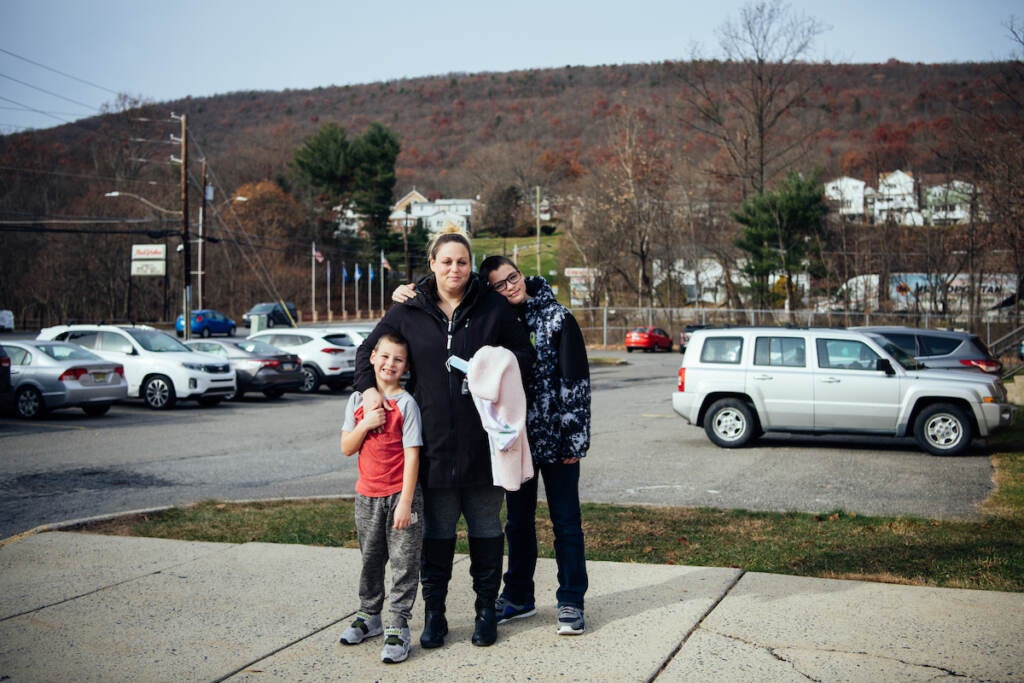
She moved here last year and enrolled her children in Panther Valley. Both the district and community were great fits.
In previous schools, she said, her children had problems with bullying. Here, they were accepted.
Outside of school, they could run barefoot, climb trees, and play in the mud.
“I just feel like they have more freedom to be kids here,” Smith said.
But like some other newcomers, she ended up in a bad housing situation. Smith said she had problems with bedbugs, but the landlord wouldn’t help out. Eventually, she ended up homeless.
Smith and her children cycled through several untenable living situations: crashing with a relative, sleeping in the car.
She said she tried calling a helpline but kept hitting deadends. Then, she reached out to the elementary school.
“I don’t even know what made me call, honestly,” Smith said. “I’m just thinking maybe there’s a homeless liaison, or something that somebody can do. That’s when I got hooked up with Nicole.”
Nicole Pollinger, the Family Development Specialist, quickly got to work. She brought Smith baby items for her newborn daughter, and connected her with a housing non-profit.
“She never really left my side since I contacted her, which was awesome,” Smith said. “I really needed that support in my life.”
But Pollinger’s position is precarious. Ametek recently sold that local manufacturing plant to a smaller company, leaving Panther Valley without an important funding stream.
For now, the district is using emergency pandemic relief funds to fill the gap. But Palazzo knows that money will eventually dry up.
“That position won’t exist unless we find another funder,” he said.
‘Trying our best’
School leaders say these supports are necessary for students to reach their potential and the state’s academic benchmarks.
“A lot of times you’re looking at the student and you’re thinking, how aren’t you getting this or why aren’t you getting this?” said Maria Szczecina, a reading teacher at Panther Valley Elementary School.
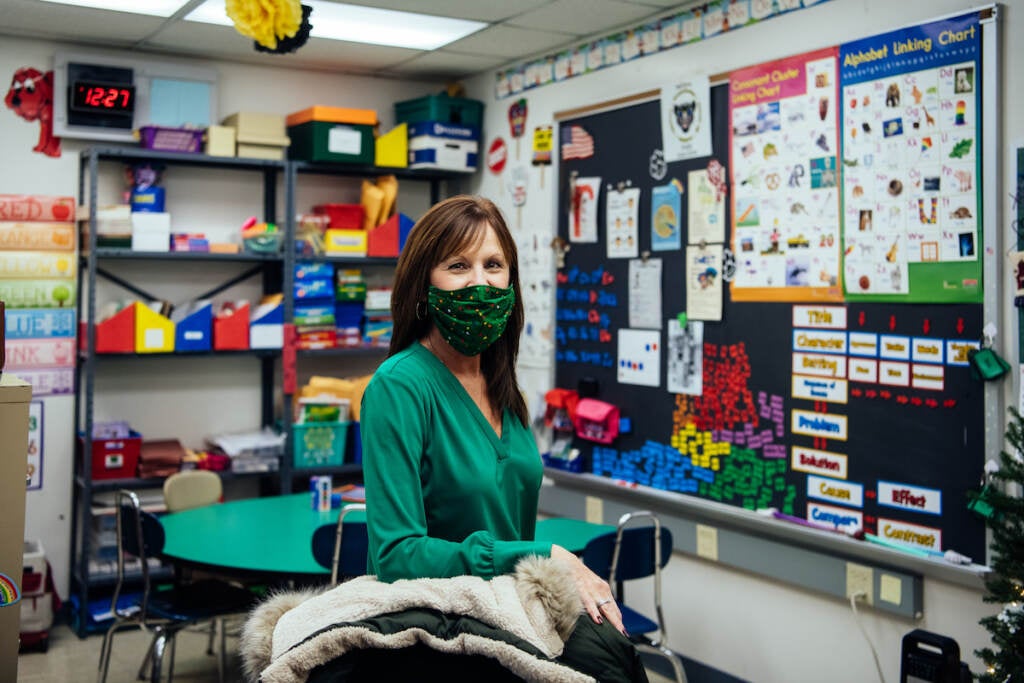
It’s important to take a step back in those moments.
“You don’t know what happened that morning before they came into school,” she said. “Did they have any food? Do they have hot water? Do they have electricity? Their homework isn’t going to be their biggest pressing issue, if all those things aren’t in place.”
Szczecina grew up in this district, has taught here for 29 years, and sent her son to the same schools she attended.
She wouldn’t want to be anywhere else, but says it’s hard to see the lack of opportunities for children.
During her son’s senior year, almost a decade ago, she started to notice changes: Teachers who retired weren’t replaced. Classes and sports programs were cut.
“Things just started trickling away, little by little,” she said.
Now, she said — her voice cracking — “I think, would I want my own son going here anymore? Because of all the things you can’t get.”
Sczcecina said she doesn’t want to cast the place she loves in a negative light, but it’s important for people to understand the reality inside under-funded schools.
“It’s hard because you come here every day and we have to defend it,” she said. “You hate to say that you have to defend it but you want people to know, we’re trying our best.”
But their best could be so much better, she says, with better funding.
For now, teachers often pay out of their own pockets to make the school as safe and inviting as possible.
Step into Kara Krajnak’s first grade classroom and there’s an explosion of color: bright Christmas lights strung up on the whiteboard, ornaments hanging from ceiling tiles.
“All the decorations in my classroom, I usually pay for,” she said.
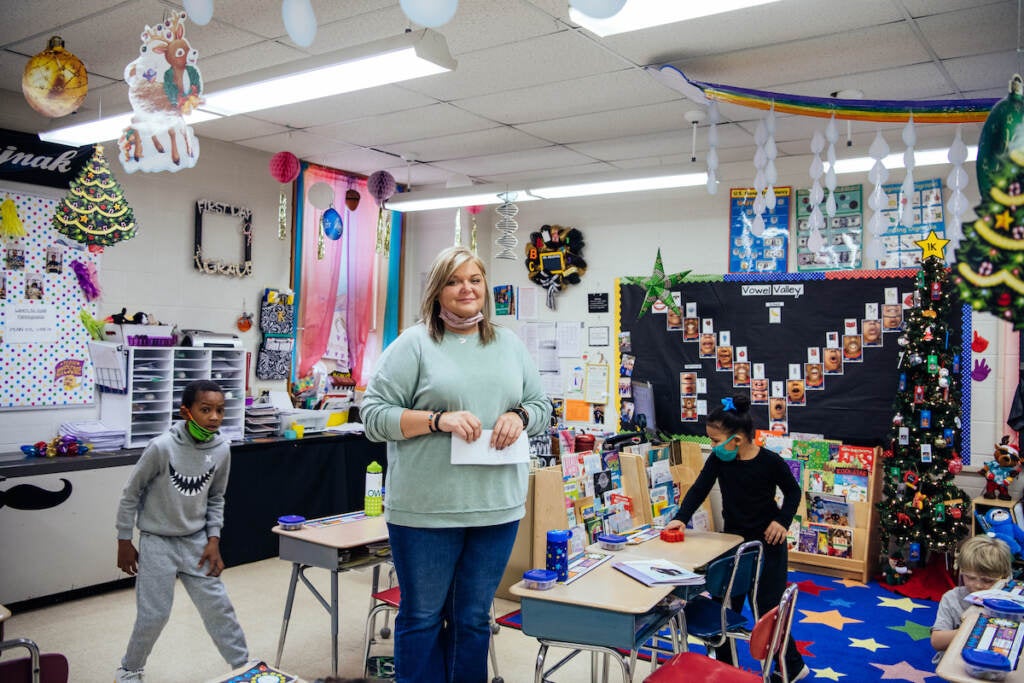
She pointed to a set of bookshelves, full of bright picture books, and noted that she bought the books herself, so her students could have a reading corner.
“I’m single and I have no kids, so these are my kids,” she said. “When I spend money to put something in here, that’s what I’m made to do.”
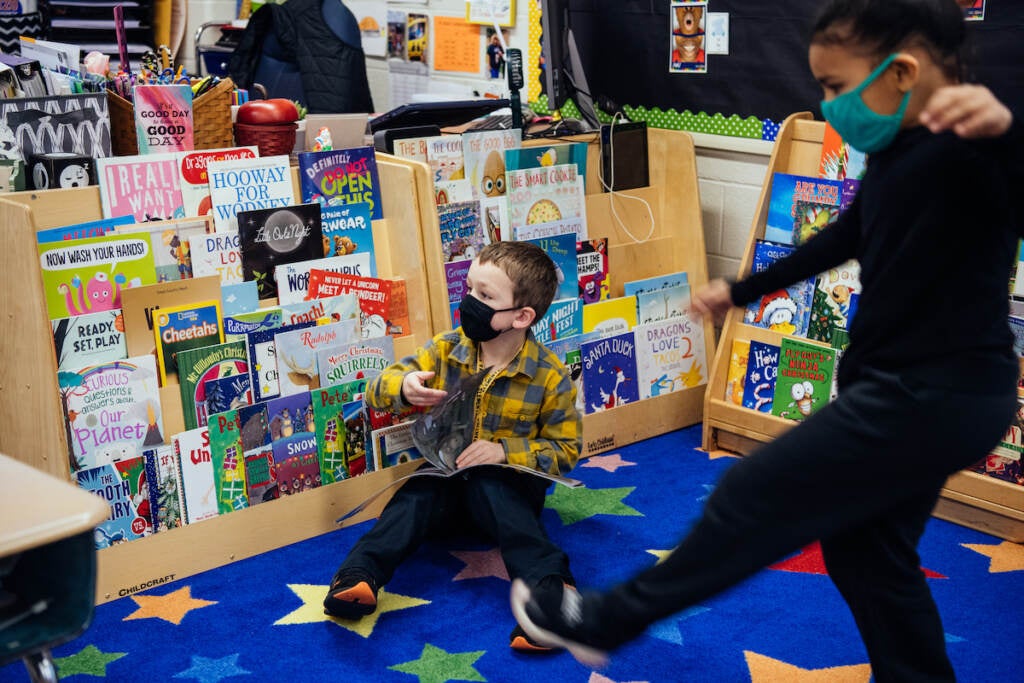
She does this, even though salaries here are substantially lower than in neighboring districts. Some teachers work second jobs, on evenings or weekends, to provide for their families.
Like Szczecina, Krajnak is a proud Panther Valley graduate, and wants to provide as much as she can for her students.
“The kids here, they deserve what other kids deserve,” she said. “It’s the community that we grew up in, and we want to see everyone thrive.”

Saturdays just got more interesting.
WHYY is your source for fact-based, in-depth journalism and information. As a nonprofit organization, we rely on financial support from readers like you. Please give today.






